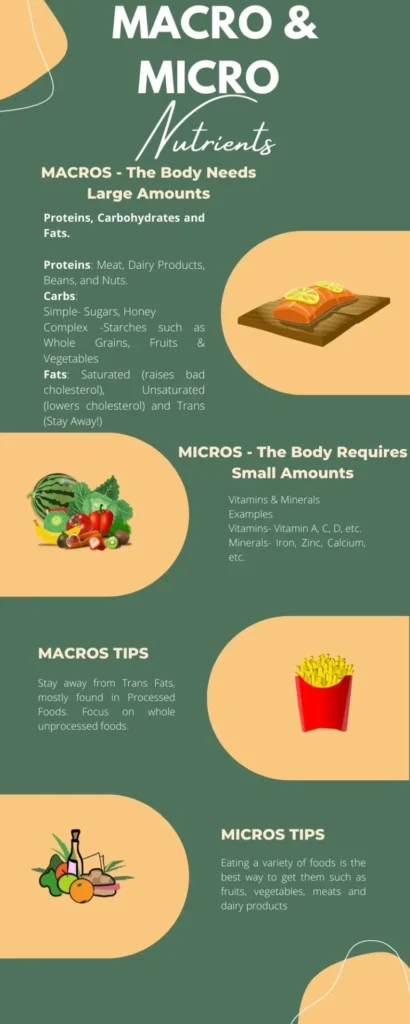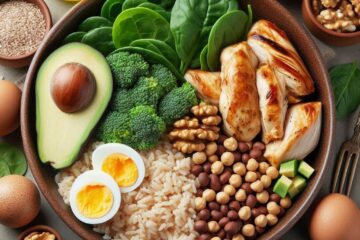Macro and Micro Nutrients

You may of heard the term “Macros” and “Micros” before when talking about diet but not that many people understand what they really are. We are going to go into more detail on what they are and how they help with your Fit Dad bod fitness goals.
Macronutrients
Macronutrients are nutrients that the body needs in large amounts to function properly and maintain good health. As a Fit Dad in your 40’s this is really important since your muscle mass and testosterone levels are lower than they were in your 20’s.
There are three main types of macronutrients: Carbohydrates, Proteins, and Fats.
Carbohydrates are the body’s main source of energy and are found in a wide variety of foods, such as bread, rice, pasta, fruits, and vegetables. They can be simple (e.g. sugars such as sugar and honey) or complex (e.g. starches such as whole grains, fruits & vegetables) and are broken down by the body into glucose, which is then used by the cells for energy.
Proteins are essential for the structure, function, and regulation of the body’s tissues and organs. They are made up of chains of amino acids and are found in a variety of foods, such as meat, dairy products, beans, and nuts. Proteins are important for the repair and growth of tissues, as well as for the production of enzymes, hormones, and other molecules.
Fats are a type of macronutrient that provide energy, insulation, and cushioning for the body. They are found in a variety of foods, such as oils, nuts, and meats. Fats are classified as saturated, unsaturated, or trans, depending on their chemical structure. Saturated fats tend to raise LDL (bad) cholesterol levels, while unsaturated fats tend to lower LDL cholesterol levels. Trans fats are particularly harmful and should be avoided.
Trans fats are a type of unsaturated fat that are commonly found in processed foods. They are created through a process called hydrogenation, which involves adding hydrogen to liquid vegetable oils to make them more solid at room temperature. Trans fats are used in many processed foods because they have a longer shelf life and can improve the texture and flavor of the food.
However, trans fats have been shown to have negative effects on health. They have been linked to an increased risk of heart disease and other health problems, and have been shown to raise levels of LDL cholesterol (also known as “bad” cholesterol) while lowering levels of HDL cholesterol (also known as “good” cholesterol). Because of these negative health effects, many countries have taken steps to limit the use of trans fats in food products. Some countries have even banned the use of trans fats in food production.
Saturated Fats Foods:
- Butter
- Cheese
- Whole milk
- Cream
- Ice cream
- Fatty cuts of meat, such as ribeye and prime rib
- Bacon
- Sausage
- Hot dogs
- Baked goods made with butter, shortening, or coconut oil, such as cookies, cakes, and pastries
- Fried foods, such as fried chicken and French fries
- Coconut oil
Unsaturated Fats Foods:
- Oils, such as olive oil, canola oil, avocado oil, and peanut oil
- Nuts and seeds, such as almonds, cashews, sunflower seeds, and pumpkin seeds
- Avocado
- Olives
- Nut butters, such as almond butter and peanut butter
- Tofu
- Fatty fish, such as salmon, mackerel, and sardines
- Flaxseeds
- Soybeans and soy products, such as tofu and edamame
Trans Fats Foods:
- Fried foods: Many fast food restaurants and other establishments use partially hydrogenated oils to fry foods like french fries, chicken nuggets, and donuts.
- Baked goods: Trans fats can be found in some baked goods, such as cookies, cakes, and pastries.
- Margarine: Some types of margarine are made with partially hydrogenated oils, which means they contain trans fats.
- Packaged snack foods: Some snack foods, such as crackers and chips, may contain trans fats.
- Non-dairy creamers: Some non-dairy creamers contain trans fats.
It is important to consume a balanced diet that includes all three macronutrients in appropriate amounts. The specific macronutrient needs of an individual will depend on a variety of factors, including age, sex, weight, height, activity level, and overall health status.
Micronutrients
Micro nutrients are essential nutrients that are required by the body in small amounts to maintain good health. They include vitamins and minerals, and they play important roles in a variety of bodily functions, including the immune system, metabolism, and the production of hormones and enzymes.
Some examples of micro nutrients include vitamin A, vitamin C, vitamin D, calcium, iron, and zinc. These nutrients are not produced by the body and must be obtained through the diet or supplements. Deficiencies in micro nutrients can lead to a range of health problems, so it is important to consume a diet that is rich in a variety of micro nutrients.
Here are some examples of food sources for some common micronutrients:
- Vitamin A: dairy products, eggs, orange and yellow vegetables (such as carrots and sweet potatoes), and dark leafy green vegetables (such as spinach and kale)
- Vitamin B12: meat, poultry, fish, eggs, and dairy products
- Vitamin C: citrus fruits (such as oranges and grapefruits), strawberries, kiwi, bell peppers, and dark leafy green vegetables
- Vitamin D: fortified milk and dairy products, fatty fish (such as salmon and mackerel), and eggs
- Vitamin E: nuts, seeds, and vegetable oils
- Calcium: dairy products, almonds, and leafy green vegetables (such as broccoli and kale)
- Iron: red meat, poultry, fish, beans, lentils, and fortified cereals
- Magnesium: nuts, seeds, whole grains, and leafy green vegetables
- Zinc: meat, poultry, seafood, and whole grains

Disclaimer: Always consult your doctor before trying anything mentioned in this article. All information in this email is intended for educational use only and is not a substitute for professional medical advice, diagnosis, or treatment. Fit Dads Over 40 is not responsible for the accuracy, completeness, suitability, or validity of any information in this article.


